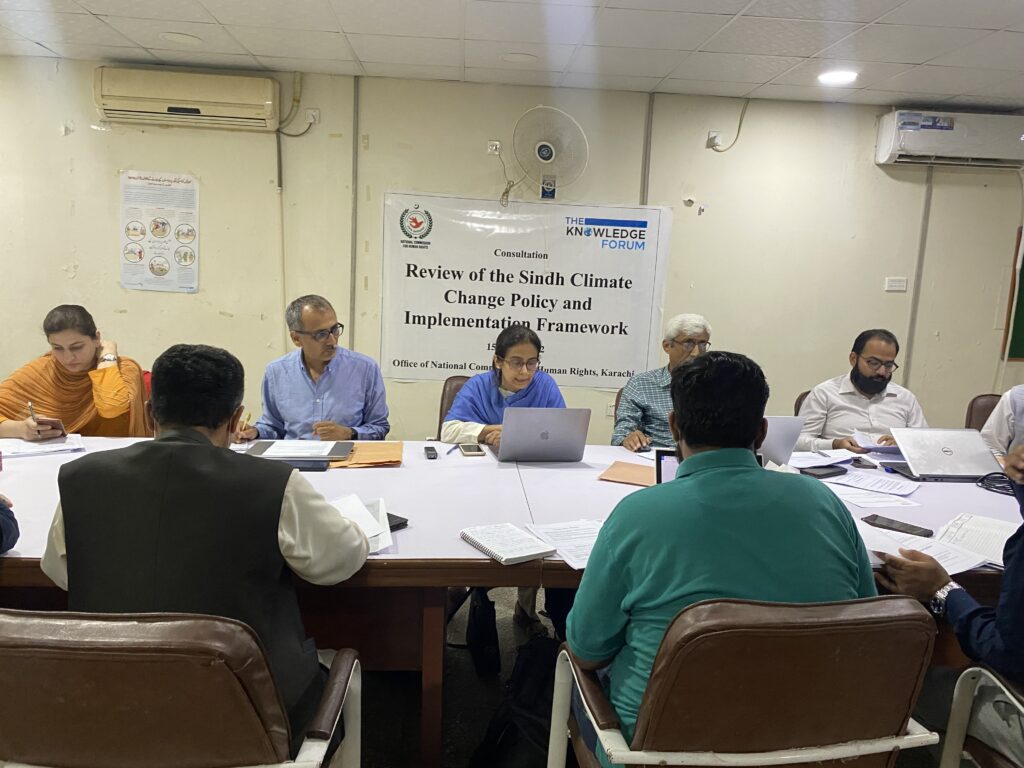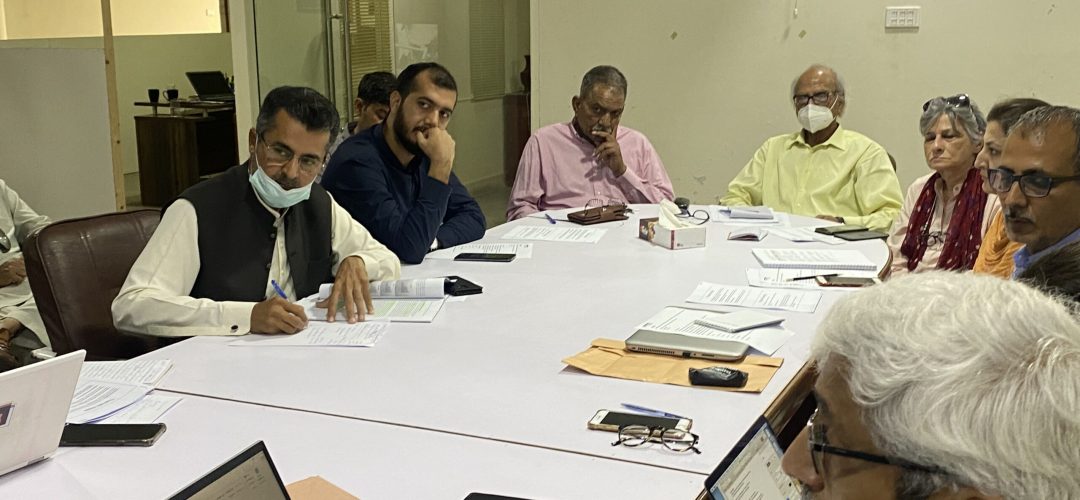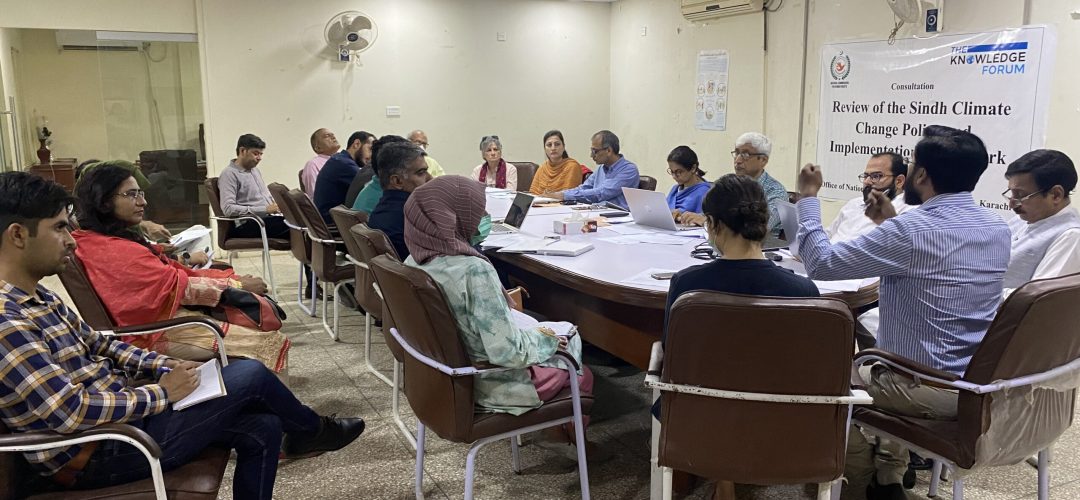Activists call to make the Sindh Climate Change Policy people-centric

Participants and team of The Knowledge Forum discuss the Sindh Climate Change Policy
KARACHI, April 15, 2022: Environmental experts, climate change activists, lawyers, journalists and civil society as well as rights activists, at a consultation on Friday, called upon the provincial government to make the Sindh Climate Change Policy people-centric and include an effective implementation mechanism for mitigating the environmental challenges that people in both rural and urban areas are facing.
The Sindh province is a fossil fuel-rich region, which contributes about 70% of the total gas production in the country. However, gas production, coupled with expansion in LNG plants are deepening Sindh’s exposure to climate change risks as the natural gas, particularly, LNG is also linked with high methane emission potential.
The Knowledge Forum organized the consultation on “Review” of the Sindh Climate Change Policy and Implementation Framework in collaboration with the National Commission for Human Rights at the latter’s Karachi Office.
Member of NCHR (Sindh) Ms. Anis Haroon presided over the meeting, while prominent among the participants of the consultation were senior trade union leader Habibuddin Junaidi, Director of Sindh Environmental Protection Agency Waqar Hussain Phulpoto, senior urban planner M. Toheed, Additional Secretary, Energy Department Dr. Abdul Shakoor Abro, Director of Aurat Foundation Mahnaz Rahman, a member of Sindh Human Rights Commission Zulfiqar Shah, Members of Sindh Human Rights Commission (SHRC) Sub-Committees Sarah Zaman and Pushpa Kumari, Zahid Farooq from Urban Resource Centre, senior lawyer Altaf Hussain Khoso, Maaz Tanveer from HANDS, Abdul Raafe from Alternative Law Collectives, Iram Aijaz from Pakistan Red Crescent Society, environmental activists Yasir Husain, Basil Andrews, and others.

Senior members of the civil society attend the consultation on Sindh Climate Change Policy
Participants pointed out various missing elements in the policy. They particularly emphasised that the policy does not recognise concretisation and carbon emission-intensive energy generation such as coal and gas as problem areas. The ongoing expansion of coal power plants in Tharparkar is likely to lead Pakistan into becoming one of the largest air pollutant, mercury and CO2 emissions hotspots in South Asia.
They also shared that there is no mention of how to mitigate the impact of heatwave in urban areas, as well as the role of District Disaster Management Authorities and other relevant authorities. Moreover, there is no mention of the resettlement policy for the climate migrants and those affected by development projects.
Participants deplored recent increase in the taxes on import of solar panels and said that the government’s measure would discourage alternative energy sources.
They said the impact of climate change is documented to be more severe in Sindh, compared to other parts of the country. The policy also noted that daily temperatures in Sindh province are projected to increase by about 5°C during the 21st century, while climatic patterns such as increasing incidences of droughts, heatwaves, air pollution due to rapid urbanization and industrialization, and water insecurity are predicted to become more common in coming years.
Explaining the main points of the Sindh Climate Change Policy, Zeenia Shaukat from The Knowledge Forum said that the Civil society’s inputs, particularly from the approach of community protection, and identification of technical gaps hindering the community agenda is crucial to ensuring the policy is representative and responsive to the impact of climate change experienced by common citizens.
The crisis is further augmented by the energy infrastructure that contributes to emissions and has been described as incompatible with the Paris Agreement.
Director of Sindh Environmental Protection Agency Waqar Hussain Phulpoto explained how the provincial Climate Change Policy was made. He pointed out that the policy was made in consultation with all the stakeholders. Consultations were held with the academia of leading universities of the province. He said the work on Sindh’s Climate Change policy started after the announcement of the federal government’s policy in 2012 and its framework in 2013. A provincial implementation committee was formed in Sindh with representation from all the line departments as well as environmental NGOs which made efforts for the formulation of the policy.

Participants share fears about the severe impact of climate change in Pakistan, particularly in Sindh
The Government of Sindh renamed the department as Environment, Climate Change & Coastal Development Department in May 2016 and now it is responsible for the passage of the Policy. He said the policy would soon be sent to the Law department for weightage and after its clearance from the Law department the provincial cabinet would approve it.
The provincial government has renamed the Environment Department as the Environment, Climate Change & Coastal Development Department, which also comprises the Sindh Environment Protection Agency (SEPA), Sindh Environment Protection Tribunal (SEPT), Sindh Coastal Development Authority (SCDA) and Climate Change.
Ms. Anis Haroon, a Member of NCHR said that politically influential people are responsible for environmental degradation. She particularly mentioned the case of the killing of Nazim Jokhio, who was fighting against the illegal hunting of houbara bustard, a migratory bird protected under various international nature conservation treaties and also under local wildlife protection laws. The powerful politicians have put enormous pressure on the family of the deceased to withdraw the case and the civil society and rights activists feel helpless to provide justice to the family.
